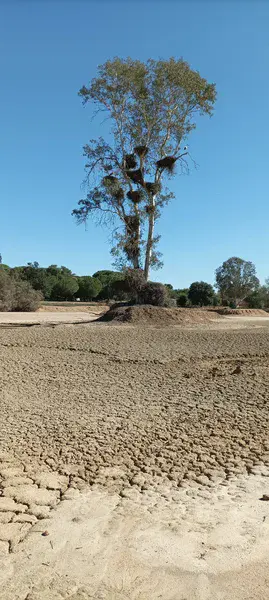
No water, no fish. No fish, no birds.
by Antonio Jordán, University of Seville, Sevilla, Spain
First, in English:
The image shows the state of one of the lagoons in the Cañada de los Pájaros (Birds Dale), a concerted nature reserve in the area surrounding the Doñana National Park (Huelva, southwestern Spain), by November 2022, just after a long summer, irrigated (in most cases, rice and strawberry crops) and many open taps in nearby tourist areas. When the lagoon dries up, the food source of the storks that inhabit the nests built on the tree (Eucalyptus camaldulensis) has disappeared. In a few meters there are some artificial lagoons and flooded rice fields, as well as other natural lagoons with food. But these are also drying up due to the water requirements of intensive agriculture (legal and illegal) in the surrounding area and an aggressive tourism model.
Ahora, en español:
La imagen muestra el estado de una de las lagunas de la Cañada de los Pájaros, una reserva natural concertada en el área que rodea el Parque Nacional de Doñana (Huelva, suroeste de España), en noviembre de 2022, justo después de un verano prolongado, regadío (en la mayoría de los casos, cultivos de arroz y fresa) y muchos grifos abiertos en núcleos turísticos cercanos. Al secarse la laguna, ha desaparecido la fuente de alimento de las cigüeñas que habitan los nidos construidos sobre el eucalipto (Eucalyptus camaldulensis). En pocos metros existen algunas lagunas artificiales y campos de arroz inundados, así como otras lagunas naturales con alimento. Pero estas también están secándose debido a los requerimientos de agua por parte de la agricultura intensiva (legal e ilegal) de los alrededores y de un modelo turístico agresivo.
Categories
- Biogeosciences (600)
- Field (2892)
- Hydrological Sciences (682)
- Natural Hazards (526)
- Soil System Sciences (957)
Location
- Europe (3885)
- Southern Europe (1685)
- Spain (813)
- Exact location (-6.1314 W, 37.2392 N)
Tags
Colours
Image properties
1792 × 4000 px;
image/jpeg; 1.7 MB
Camera:
Xiaomi M2103K19G
Taken on 5
November
2022
Submitted on 9 November 2022
Licence
Creative Commons Attribution-ShareAlike 3.0 Unported (CC BY-SA 3.0)
Credit
Antonio Jordán (distributed via imaggeo.egu.eu)
Share
Appreciate
Report